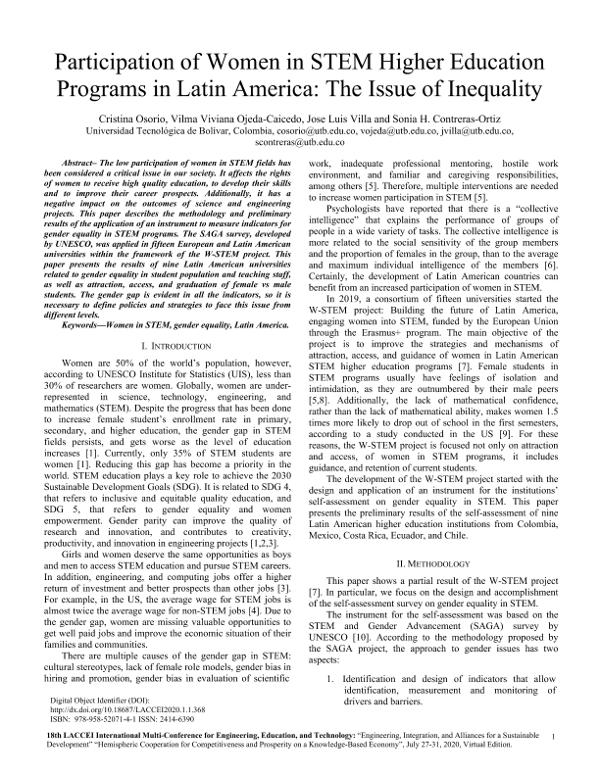Mostrar el registro sencillo del ítem
Participation of women in STEM higher education programs in Latin america: The issue of inequality
| dc.contributor.author | Contreras Ortiz, Sonia Helena | |
| dc.contributor.author | Villla-Ramírez, Jose Luis | |
| dc.contributor.author | Osorio-Delvalle, Cristina | |
| dc.contributor.author | Ojeda-Caicedo, Vilma | |
| dc.date.accessioned | 2021-02-15T16:20:08Z | |
| dc.date.available | 2021-02-15T16:20:08Z | |
| dc.date.issued | 2020-07-27 | |
| dc.date.submitted | 2021-02-12 | |
| dc.identifier.citation | 18th LACCEI International Multi-Conference for Engineering, Education, and Technology: “Engineering, Integration, and Alliances for a Sustainable Development” “Hemispheric Cooperation for Competitiveness and Prosperity on a Knowledge-Based Economy”, July 27-31, 2020, Virtual Edition | spa |
| dc.identifier.isbn | 978-958-52071-4-1 | |
| dc.identifier.uri | https://hdl.handle.net/20.500.12585/10002 | |
| dc.description.abstract | The low participation of women in STEM fields has been considered a critical issue in our society. It affects the rights of women to receive high quality education, to develop their skills and to improve their career prospects. Additionally, it has a negative impact on the outcomes of science and engineering projects. This paper describes the methodology and preliminary results of the application of an instrument to measure indicators for gender equality in STEM programs. The SAGA survey, developed by UNESCO, was applied in fifteen European and Latin American universities within the framework of the W-STEM project. This paper presents the results of nine Latin American universities related to gender equality in student population and teaching staff, as well as attraction, access, and graduation of female vs male students. The gender gap is evident in all the indicators, so it is necessary to define policies and strategies to face this issue from different levels | spa |
| dc.format.extent | 5 páginas | |
| dc.format.mimetype | application/pdf | spa |
| dc.language.iso | eng | spa |
| dc.rights.uri | http://creativecommons.org/licenses/by-nc-nd/4.0/ | * |
| dc.source | Engineering, Integration, and Alliances for a Sustainable Development. Hemispheric Cooperation for Competitiveness and Prosperity on a Knowledge-Based Economy: Proceedings of the 18th LACCEI International Multi-Conference for Engineering, Education and Technology | spa |
| dc.title | Participation of women in STEM higher education programs in Latin america: The issue of inequality | spa |
| dcterms.bibliographicCitation | Chavatzia, Theophania. Cracking the code: Girls’ and women's education in science, technology, engineering and mathematics (STEM). Vol. 253479. Paris: UNESCO Retrieved from http://unesdoc. unesco. org/images/0025/002534, 2017. | spa |
| dcterms.bibliographicCitation | Lee, Heisook, and Elizabeth Pollitzer. Gender in science and innovation as component of inclusive socioeconomic growth. Portia Limited, 2016 | spa |
| dcterms.bibliographicCitation | Corbett, Christianne, and Catherine Hill. Solving the Equation: The Variables for Women's Success in Engineering and Computing. American Association of University Women. 1111 Sixteenth Street NW, Washington, DC 20036, 2015 | spa |
| dcterms.bibliographicCitation | Fayer, Stella, Alan Lacey, and Audrey Watson. "STEM occupations: Past, present, and future." Spotlight on Statistics (2017): 1-35. | spa |
| dcterms.bibliographicCitation | Dasgupta, Nilanjana, and Jane G. Stout. "Girls and women in science, technology, engineering, and mathematics: STEMing the tide and broadening participation in STEM careers." Policy Insights from the Behavioral and Brain Sciences 1, no. 1 (2014): 21-29. | spa |
| dcterms.bibliographicCitation | Woolley, Anita Williams, Christopher F. Chabris, Alex Pentland, Nada Hashmi, and Thomas W. Malone. "Evidence for a collective intelligence factor in the performance of human groups." science 330, no. 6004 (2010): 686-688. | spa |
| dcterms.bibliographicCitation | García-Holgado, Alicia, Amparo Camacho Díaz, and Francisco J. GarcíaPeñalvo. "Engaging women into STEM in Latin America: W-STEM project." In Proceedings of the Seventh International Conference on Technological Ecosystems for Enhancing Multiculturality, pp. 232-239. ACM, 2019. | spa |
| dcterms.bibliographicCitation | Clark Blickenstaff*, Jacob. "Women and science careers: leaky pipeline or gender filter?." Gender and education 17, no. 4 (2005): 369-386. | spa |
| dcterms.bibliographicCitation | Ellis, Jessica, Bailey K. Fosdick, and Chris Rasmussen. "Women 1.5 times more likely to leave STEM pipeline after calculus compared to men: Lack of mathematical confidence a potential culprit." PloS one 11, no. 7 (2016): e0157447. | spa |
| dcterms.bibliographicCitation | UNESCO, Measuring Gender Equality in Science and Engineering: the SAGA Toolkit, SAGA Working Paper 2, Paris, 2017. | spa |
| dcterms.bibliographicCitation | UNESCO, the SAGA Survey of Gender Equality STI Policies and Instruments, SAGA Working Paper 3, Paris, 2018. | spa |
| dcterms.bibliographicCitation | UNESCO, The SAGA Survey of Drivers and Barriers to Careers in Science and Engineering, SAGA Working Paper 4, Paris, 2018 | spa |
| dcterms.bibliographicCitation | Finquelievich, Susana, and Celina Fischnaller. "Ciencia ciudadana en la Sociedad de la Información: nuevas tendencias a nivel mundial." Revista Iberoamericana CTS, no. 27, vol. 9 (2014): 11-31. | spa |
| datacite.rights | http://purl.org/coar/access_right/c_abf2 | spa |
| oaire.version | http://purl.org/coar/version/c_970fb48d4fbd8a85 | spa |
| dc.identifier.url | http://laccei.org/LACCEI2020-VirtualEdition/meta/FP368.html | |
| dc.type.driver | info:eu-repo/semantics/lecture | spa |
| dc.type.hasversion | info:eu-repo/semantics/publishedVersion | spa |
| dc.identifier.doi | 10.18687/LACCEI2020.1.1.368 | |
| dc.subject.keywords | Gender equality | spa |
| dc.subject.keywords | Latin America | spa |
| dc.subject.keywords | Women in STEM | spa |
| dc.rights.accessrights | info:eu-repo/semantics/openAccess | spa |
| dc.rights.cc | Attribution-NonCommercial-NoDerivatives 4.0 Internacional | * |
| dc.identifier.instname | Universidad Tecnológica de Bolívar | spa |
| dc.identifier.reponame | Repositorio Universidad Tecnológica de Bolívar | spa |
| dc.publisher.place | Cartagena de Indias | spa |
| dc.subject.armarc | LEMB | |
| dc.type.spa | http://purl.org/coar/resource_type/c_8544 | spa |
| dc.audience | Público general | spa |
| oaire.resourcetype | http://purl.org/coar/resource_type/c_c94f | spa |
Ficheros en el ítem
Este ítem aparece en la(s) siguiente(s) colección(ones)
-
Productos de investigación [1453]
Universidad Tecnológica de Bolívar - 2017 Institución de Educación Superior sujeta a inspección y vigilancia por el Ministerio de Educación Nacional. Resolución No 961 del 26 de octubre de 1970 a través de la cual la Gobernación de Bolívar otorga la Personería Jurídica a la Universidad Tecnológica de Bolívar.













